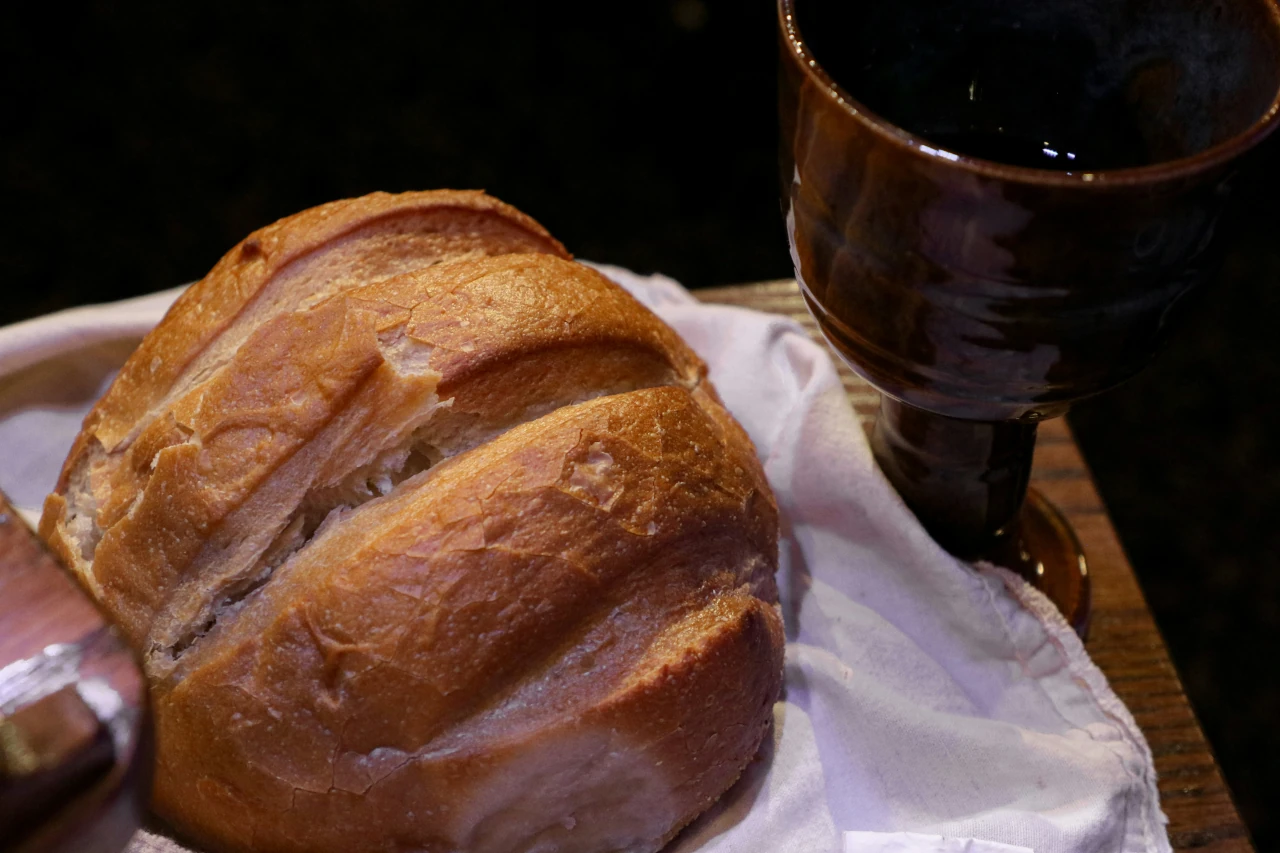Introduction: What Is Holy Communion?
Holy Communion, which is also known as the Eucharist or the Lord’s Supper, is one of the most sacred and meaningful practices in Christianity.
It is a time for believers to remember Jesus Christ’s sacrifice. Let them reflect on His love, and strengthen their relationship with God.
Holy Communion is a sacred Christian practice where believers partake in bread and wine to remember Jesus’ sacrifice.
By partaking in the bread and wine, Christians honour Jesus’ command at the Last Supper. To “do this in remembrance of me” (Luke 22:19).
Communion is more than a ritual, it’s an act of worship that connects us to Christ.
Whether celebrated weekly, monthly, or on special occasions, Holy Communion serves as a powerful reminder of Jesus’ death, resurrection, and the promise of eternal life.
The Biblical Origins of Holy Communion
The roots of Holy Communion can be found in the Bible. Beginning with the Last Supper, the final meal Jesus shared with His disciples before His crucifixion.
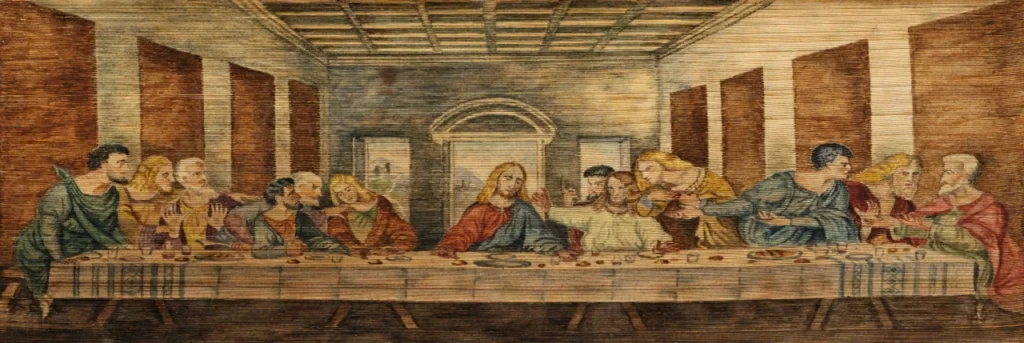
During this meal, Jesus instituted the practice of Communion as a way for His followers to remember His sacrifice.
In Luke 22:19-20, Jesus took bread, gave thanks, broke it, and said, “This is my body given for you; do this in remembrance of me.”
He then took the cup, saying, “This cup is the new covenant in my blood, which is poured out for you.”
These words established the foundation for Communion, symbolizing Jesus’ body broken and His blood shed for the forgiveness of sins.
The Apostle Paul also emphasized the significance of this sacred practice in 1 Corinthians 11:23-26.
He reminded believers, “For whenever you eat this bread and drink this cup, you proclaim the Lord’s death until He comes.”
Paul’s teaching reinforced that Communion is both a remembrance of Christ’s sacrifice and a proclamation of hope in His return.
By participating in Holy Communion, Christians not only honour Jesus’ command, but also experience a deep spiritual connection with Him.
This practice has been central to Christian worship for centuries, symbolizing unity, gratitude, and faith.
The Symbolism of Holy Communion
Holy Communion is rich in symbolism, with each element representing profound spiritual experience that connect believers to Jesus Christ.
The bread and wine are more than physical objects. They carry deep meaning that reminds us of God’s grace and love.
The bread symbolizes the body of Christ, which was broken for us on the cross.
Jesus said in John 6:51, “I am the living bread that came down from heaven. Whoever eats this bread will live forever. This bread is my flesh, which I will give for the life of the world.”
Partaking in the bread reminds us of His suffering and the sacrifice He made to bring us salvation.
The wine represents the blood of Christ, poured out for the forgiveness of sins.
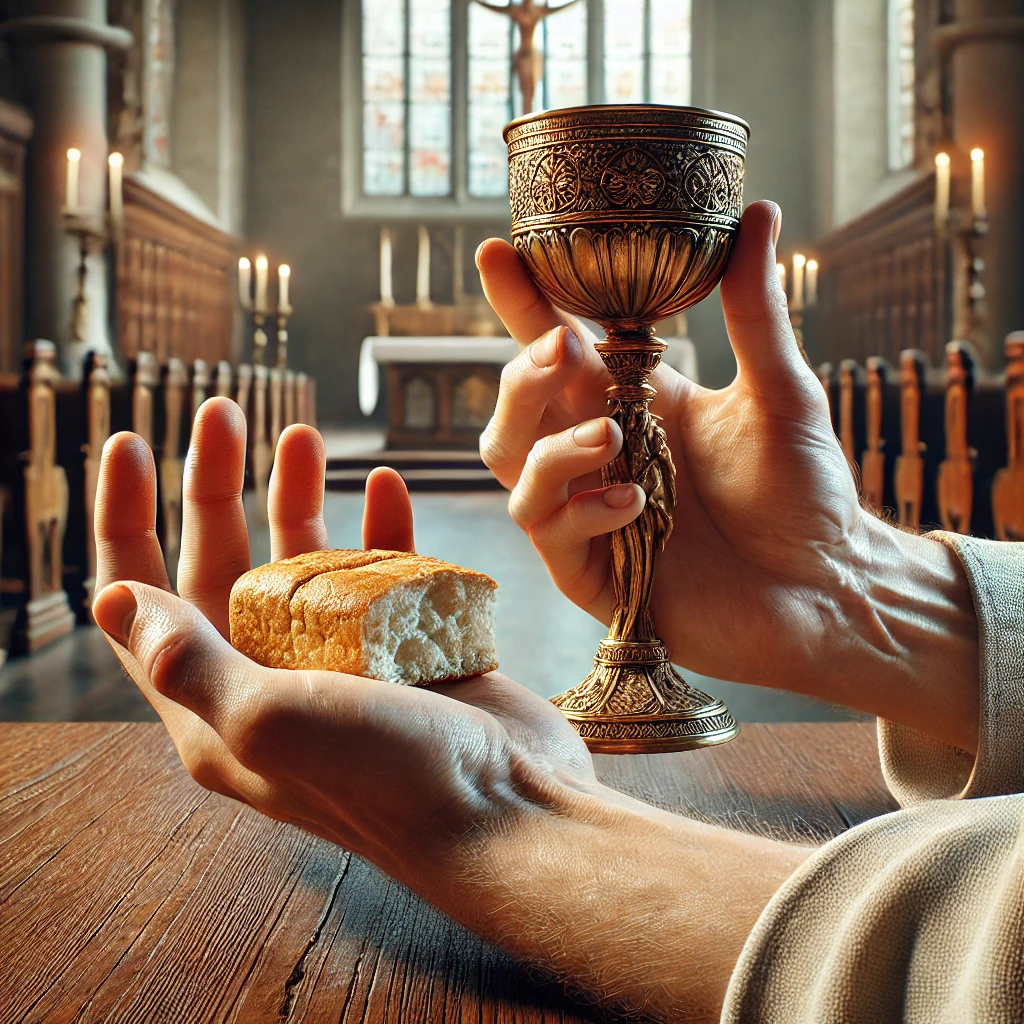
In Matthew 26:28, Jesus declared, “This is my blood of the covenant, which is poured out for many for the forgiveness of sins.”
Drinking from the cup is a reminder of the new covenant. It’s a relationship with God made possible through Christ’s atoning death.
Beyond the bread and wine, Holy Communion also symbolizes unity among believers.
In 1 Corinthians 10:17, Paul writes, “Because there is one loaf, we, who are many, are one body, for we all share the one loaf.”
Communion unites Christians as members of the body of Christ, fostering a sense of community and shared faith.
Finally, Holy Communion is a powerful symbol of hope and renewal.
By partaking in it, we not only remember Jesus’ death but also celebrate His resurrection.
As 1 Corinthians 11:26 reminds us, “For whenever you eat this bread and drink this cup, you proclaim the Lord’s death until He comes.”
Through these symbols, Holy Communion invites believers to reflect on Christ’s love, grace, and live in unity with one another.
Why Holy Communion Is Important
Holy Communion holds deep spiritual significance in the life of every believer.
It is not just a symbolic act but a vital practice that strengthens faith, fosters unity, and reminds us of God’s immense love and grace.
1. It Remembers Christ’s Sacrifice
At the heart of Holy Communion is the remembrance of Jesus’ sacrifice on the cross. When we partake in the bread and wine, we reflect on His suffering and death for our sins.
As Luke 22:19 states, Jesus said, “Do this in remembrance of me.” This act of remembrance allows us to focus on His ultimate gift of salvation.
2. It Strengthens Our Relationship with God
Communion is a sacred time to draw closer to God. By partaking, we reaffirm our faith in Christ and our gratitude for His work in our lives.
John 6:56 highlights this connection: “Whoever eats my flesh and drinks my blood remains in me, and I in them.” This intimate connection with Christ strengthens our spiritual walk and reminds us that He is always with us.
3. It Fosters Unity Among Believers
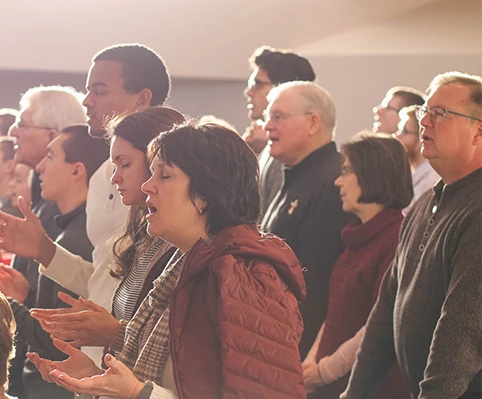
Holy Communion unites Christians as members of the body of Christ. Regardless of denomination or background, believers come together in this shared act of worship.
1 Corinthians 10:17 states, “Because there is one loaf, we, who are many, are one body, for we all share the one loaf.” This unity reflects God’s desire for His followers to live in harmony and love.
4. It Encourages Self-Reflection and Renewal
Communion invites us to examine our hearts and seek forgiveness for any sins. It’s a moment of spiritual renewal where we acknowledge our dependence on God’s grace.
Paul reminds us in 1 Corinthians 11:28, “Everyone ought to examine themselves before they eat of the bread and drink from the cup.” This self-reflection helps us grow in faith and live a more Christ-centered life.
5. It Proclaims the Hope of Christ’s Return
Each time we take Communion, we proclaim Jesus’ death and anticipate His return.
1 Corinthians 11:26 emphasizes this hope: “For whenever you eat this bread and drink this cup, you proclaim the Lord’s death until He comes.”
It’s a reminder that our faith is not just rooted in the past but also in the glorious future God has promised.
In summary, Holy Communion is a powerful act of worship that deepens our faith, strengthens our relationship with God, and unites us with fellow believers.
It is a time of gratitude, reflection, and renewal, reminding us of Christ’s love and the hope we have in Him.
How Holy Communion Is Observed
Holy Communion is celebrated by Christians around the world, but the way it is observed can vary depending on the denomination and tradition.
Despite these differences, the core meaning remains the same: remembering Jesus Christ’s sacrifice and renewing faith in Him.
Different Traditions
- Catholic Eucharist: In Catholic churches, the Eucharist is a central part of every Mass. Catholics believe in transubstantiation, where the bread and wine become the actual body and blood of Christ. Receiving the Eucharist is seen as receiving Christ Himself.
- Protestant Communion: In many Protestant denominations, Communion is observed as a symbolic act of remembrance. Some churches celebrate it weekly, while others hold it monthly or quarterly.
- Orthodox Churches: In Eastern Orthodox traditions, Communion is considered a sacred mystery and is typically offered during the Divine Liturgy.
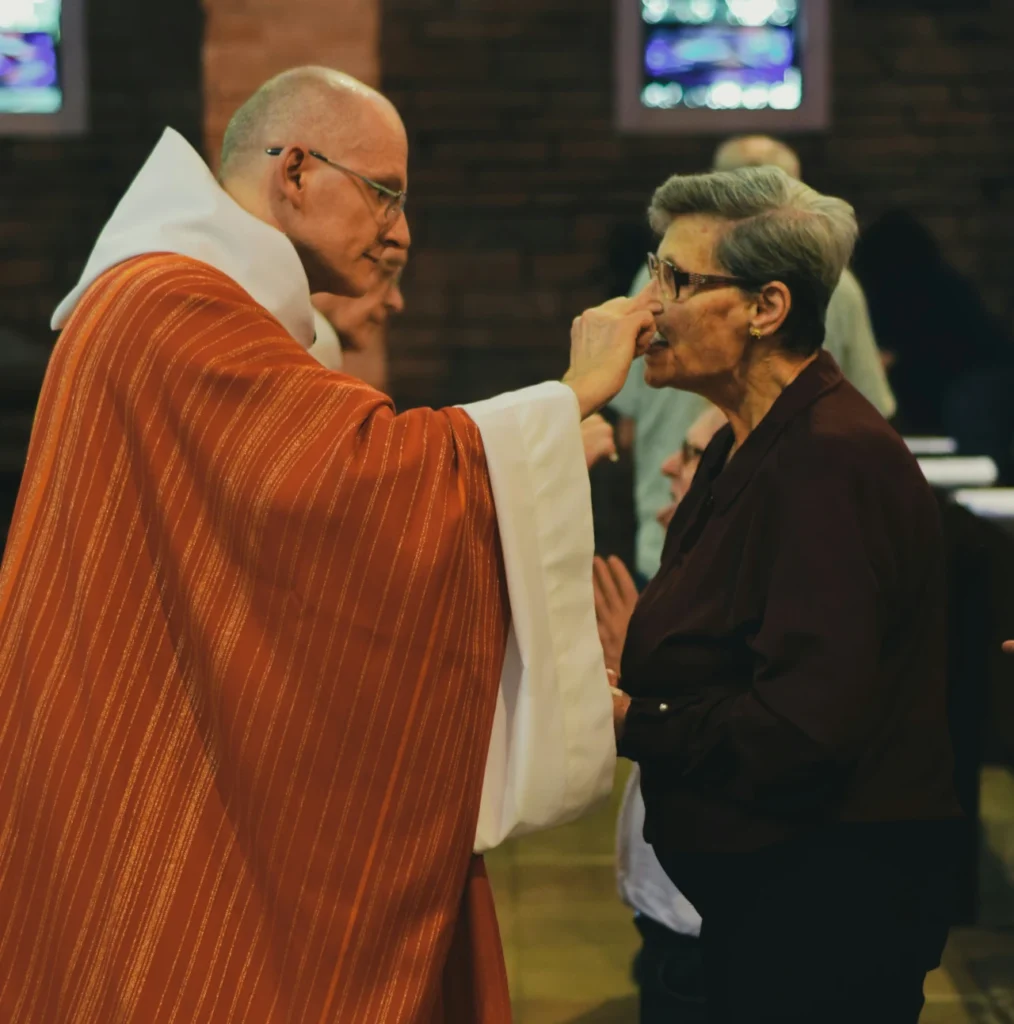
The Elements: Bread and Wine
The bread and wine (or grape juice in some traditions) are the primary elements used in Communion.
These represent the body and blood of Christ, as instituted by Jesus during the Last Supper (Luke 22:19-20).
Some traditions use unleavened bread to reflect the bread used at the Passover meal, while others use leavened bread.
The Frequency of Communion
The frequency of Holy Communion varies among Christians. Some churches celebrate it every Sunday as part of their regular worship, while others observe it on special occasions or during major religious seasons such as Easter or Christmas.
Preparation for Communion
Many Christians believe that preparation is an important part of taking Communion. This often involves self-examination, confession, and prayer to approach the table with a humble heart.
Paul emphasizes this in 1 Corinthians 11:27-28: “So then, whoever eats the bread or drinks the cup of the Lord in an unworthy manner will be guilty of sinning against the body and blood of the Lord. Everyone ought to examine themselves before they eat of the bread and drink from the cup.”
The Role of the Church
Communion is typically administered by a pastor, priest, or church leader, although in some traditions, it can also be celebrated in small groups or family gatherings.
The community aspect of Communion highlights the unity of the church as the body of Christ.
A Time of Worship and Reverence
Communion is often accompanied by worship, Scripture reading, and prayer. It is a time of deep reflection and gratitude, allowing believers to focus on Jesus’ sacrifice and their relationship with Him.
No matter how it is observed, Holy Communion serves as a powerful reminder of Jesus’ love, His sacrifice, and the hope of eternal life. It is a sacred act that connects believers to Christ and to one another.
Common Questions About Holy Communion
Holy Communion is a deeply meaningful practice, but it can also raise questions, especially for those new to the faith.
Here are some of the most common questions about Communion, along with biblical insights to clarify its purpose and significance.
1. Who Can Take Holy Communion?
Most Christian denominations encourage baptized believers to partake in Communion. It’s a sacred act of faith, intended for those who trust in Jesus as their Saviour. However, practices vary:
- Catholic Church: Only baptized Catholics who are in a state of grace (free from mortal sin) may receive Communion.
- Protestant Churches: Many Protestant denominations welcome all believers, though some encourage attendees to reflect on their faith first.
- Orthodox Church: Communion is reserved for Orthodox Christians who have prepared through confession and fasting.
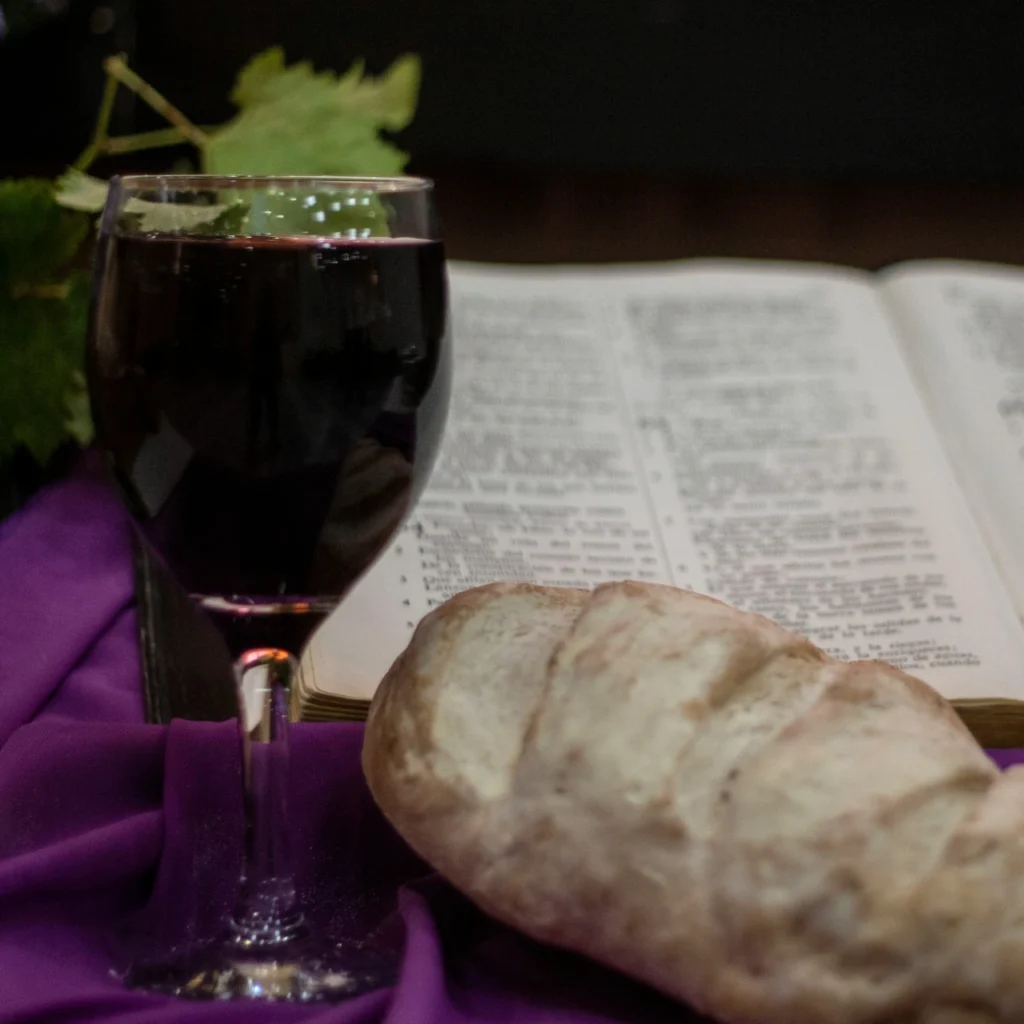
1 Corinthians 11:28 reminds us, “Everyone ought to examine themselves before they eat of the bread and drink from the cup.” This self-reflection ensures participants approach Communion with reverence.
2. Is Holy Communion Symbolic or Literal?
The understanding of Communion’s nature varies:
- Catholics and Orthodox Christians: Believe in the literal presence of Christ, where the bread and wine become His body and blood (transubstantiation).
- Protestants: Typically view the bread and wine as symbolic representations of Jesus’ sacrifice, focusing on remembrance rather than literal transformation.
Jesus’ words in John 6:53-54, “Whoever eats my flesh and drinks my blood has eternal life,” are interpreted differently across traditions, but all agree on the profound spiritual significance of the act.
3. Can Children Take Communion?
This depends on the denomination:
- Catholic Church: Children may take their First Communion after receiving instruction and reaching the age of reason (typically around age 7).
- Protestant Churches: Many allow children to participate once they have a basic understanding of what Communion represents.
- Orthodox Church: Infants and children who are baptized in the Orthodox faith can partake in Communion.
Matthew 19:14 reminds us of Jesus’ heart for children: “Let the little children come to me, and do not hinder them, for the kingdom of heaven belongs to such as these.”
4. What If I Don’t Feel “Worthy” to Take Communion?
It’s natural to feel unworthy at times, but Communion is a reminder of God’s grace and forgiveness. If you’re struggling with sin or doubt, take a moment to pray and seek God’s guidance.
1 John 1:9 reassures us, “If we confess our sins, he is faithful and just and will forgive us our sins and purify us from all unrighteousness.”
Communion is not about perfection—it’s about coming to God with a humble and repentant heart.
5. Can I Take Communion at Home?
In many traditions, Communion is administered by a church leader in a communal setting.
However, some believers celebrate it at home, especially during times when gathering is difficult (e.g., illness or pandemic restrictions).
If done reverently and with proper preparation, taking Communion at home can still be meaningful.
Matthew 18:20 reminds us, “For where two or three gather in my name, there am I with them.”
6. What Happens If I Take Communion “Unworthily”?
Paul warns in 1 Corinthians 11:27-29 against taking Communion in an unworthy manner, which means doing so without proper reflection or respect for its significance.
This doesn’t mean you must be perfect, but you should approach Communion with sincerity, reverence, and a heart focused on Christ.
Conclusion to FAQs
Holy Communion is a sacred practice that invites believers to reflect on their relationship with Christ, remember His sacrifice, and grow in faith.
If you have additional questions about Communion, consider speaking with your pastor or exploring the Bible for further guidance. If you are still unsure, feel free to leave a comment and ask a question, we have a great community willing to help anyone.
Conclusion: Reflecting on the Gift of Holy Communion
Holy Communion is more than a ritual—it’s a sacred invitation to deepen your relationship with God, remember Jesus’ sacrifice, and renew your faith. Through the bread and wine, we are reminded of Christ’s love, the forgiveness of sins, and the promise of eternal life. It’s a moment to pause, reflect, and realign our hearts with God’s will.
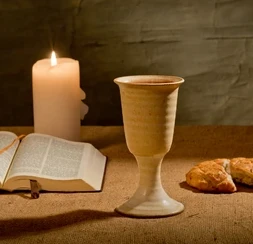
As we partake in Communion, we are not only honouring Jesus’ command to “do this in remembrance of me” (Luke 22:19) but also proclaiming the hope of His return. It’s a powerful act of worship that connects us to Christ and to one another as the body of believers.
Whether you’re new to the faith or have celebrated Communion for years, approach it with reverence, gratitude, and an open heart. Reflect on the meaning behind the bread and wine, and let it remind you of God’s incredible grace and love.
If you’d like to explore more about connecting with God in prayer, check out our related post: How to Talk to God and Hear His Voice. Together, these practices of prayer and Communion can transform your faith and draw you closer to God.
Take a moment today to thank God for the gift of Holy Communion and the grace it represents. May it strengthen your faith and fill you with hope for the journey ahead.
Newsletter
If you’ve been inspired by this post about Holy Communion, why not continue your faith journey with us? By joining our newsletter, you’ll receive inspiring articles, biblical insights, and practical resources delivered straight to your inbox.
Our newsletter is designed to help you grow deeper in your relationship with God, with topics like prayer, Scripture study, and Christian living. Whether you’re exploring your faith or looking to strengthen it, we’re here to walk alongside you every step of the way.
Sign up today and stay connected as we explore God’s Word together. Let’s grow in faith, reflect His love, and live out the incredible hope we have in Christ!
